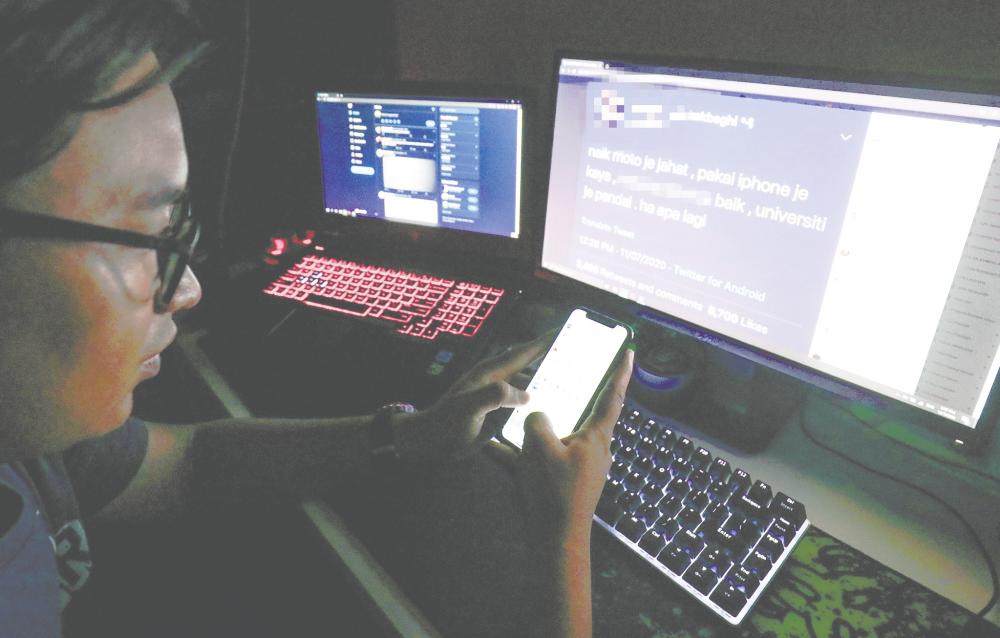PETALING JAYA: Increasing cases of cyberbullying and the deliberate spread of misinformation on social media platforms are threatening societal harmony, said cybersecurity expert Muhamad Fitri Ahmad Adin from rawSEC, a Malaysian cybersecurity community.
“Cyberbullying and online slander show how technology is being weaponised, shifting harm
from physical aggression to digital attacks,” he said, adding that many perpetrators use social engineering techniques to gather personal details, often exploiting openly shared information or
using specialised tools to breach privacy.
He said the issue is compounded by weak verification processes on social media platforms, allowing individuals to create false identities and operate anonymously.
“Moderators often struggle to ensure user profiles are genuine, making it easier for cyberbullies to target victims. Hate speech also remains a pressing concern in Malaysia, frequently targeting ethnicity, religion or political beliefs,” he added.
Muhamad Fitri said a study revealed that 13.7% of 1,290 secondary school students surveyed had experienced cyberbullying, while 3.8% admitted to being perpetrators.
A total of 17.1% of teenagers who faced cyberbullying said they considered suicide due to the deep emotional effects of online abuse.
Microsoft’s Digital Civility Index further underscores the problem, with Malaysia’s score worsening from 59 in 2019 to 63 in 2020.
This decline reflects an increase in hate speech, scams and online discrimination.
Muhamad Fitri said to mitigate these challenges, social media platforms have introduced tools aimed at fostering a safer digital environment.
“Features like comment restrictions, enhanced privacy settings and filters for offensive content empower users to reduce exposure to harmful interactions and create positive spaces online. The impact of these tools is significant, as they provide users with greater control over their digital environment,” he said.
Monash University Malaysia cyber-psychologist Dr Lee Soon Li said anonymity on social media often reduces accountability, enabling negative behaviour.
The phenomenon, known as the “disinhibition effect”, allows people to express more negativity online than they would through face-to-face contact.
“Social media algorithms often amplify such behaviour by creating echo chambers, where negative emotions such as anger and sadness spread faster than positive ones. This further fuels hostility and polarisation,” said Lee.
He added that the lack of non-verbal cues in online communication reduces empathy and increases the likelihood of misunderstandings and conflicts.
“Over time, individuals who engage in such negativity may isolate themselves, worsening their mental health and perpetuating harmful behaviours. The impact of online harassment is severe and can range from heightened anxiety and depression to suicide in some cases.”
The tragic death of Rajeswary Appahu, better known as Esha, brought these issues to the forefront.
Esha, who was a social media influencer, took her life on July 5 after filing a police report about threats and defamation directed at her on social media.
The incident caused widespread outcry and prompted Minister in the Prime Minister’s Department (Law and Institutional Reforms) Datuk Seri Azalina Othman Said to introduce Section 507D(2), also known as the “Esha Clause”, as part of the Penal Code (Amendment) (No. 2) Bill 2024.
Azalina said the clause aims to prevent bullying-related tragedies by imposing stricter penalties.
Offenders convicted under this law face up to one year in prison or fines, with more severe cases – such as those leading to suicide – carrying penalties of up to 10 years in prison, or both.
The Bill also includes provisions targeting “revenge porn” and imposes heavy penalties to protect the privacy and dignity of victims.
“These amendments are crucial to address the emotional and psychological toll of online harassment and help ensure no more lives are lost to bullying,” Azalina said during the introduction of the Bill.
Lee highlighted the need for greater public awareness about responsible social media use and the psychological effects of cyberbullying.
“Preventing these issues requires collective efforts, including education, community engagement and better platform accountability,”
he added.









